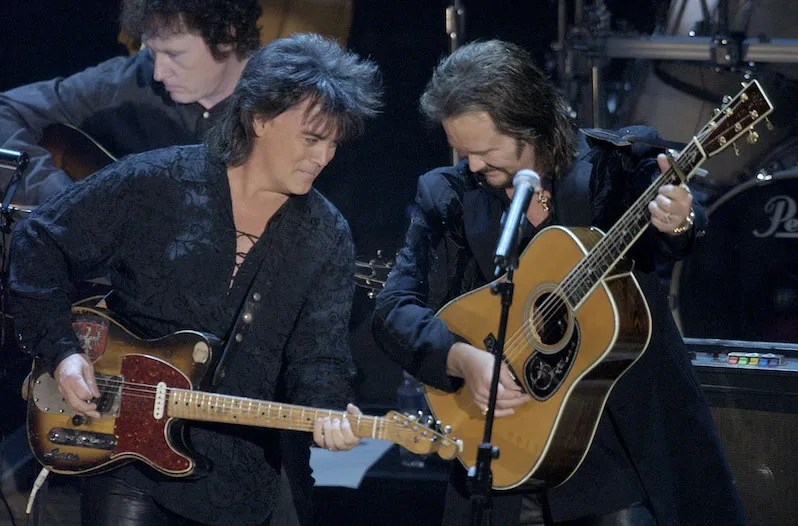
Two voices learning the same hard lesson—love doesn’t end cleanly, it echoes, and the echo is the part that hurts the longest.
Essentials up front. Song: “This One’s Gonna Hurt You (For a Long, Long Time)”. Artists: Marty Stuart with Travis Tritt. Album: This One’s Gonna Hurt You (title track; MCA Nashville). Single release: June 1, 1992; album release July 7, 1992. Writer: Marty Stuart. Producers: Richard Bennett and Tony Brown. U.S. peak: No. 7, Billboard Hot Country Songs; Canada: No. 6 (RPM Country Tracks). Awards: CMA Musical Event of the Year (1992). Video: black-and-white studio clip directed by John Lloyd Miller.
When this record hit radio in the summer of ’92, country was stretching itself—bigger stages, brighter lights—but Stuart and Tritt planted their flag in something older and sturdier: a straight-talking honky-tonk duet carried by telecaster snap, steel sighs, and two voices that meet in the middle without crowding each other. It was the lead single and namesake of Stuart’s sixth studio album, a tidy declaration that he wasn’t chasing trends; he was doubling down on craft. That clarity translated into numbers: a Top 10 U.S. hit and an even stronger run in Canada, the best kind of chart story—proof that honesty still travels.
Part of why the song endures is how plain the lyric is. There’s no venom, no clever twist—just the adult truth that if you walk away from the real thing, you don’t walk away unmarked. Stuart’s line—this one’s gonna hurt you for a long, long time—lands like something said at a kitchen table after the arguing stops. Tritt answers with that grainy baritone of his, a little bruised around the edges, and suddenly the message becomes a conversation, not a pronouncement. For listeners who remember navigating their own goodbyes in those years, it felt less like a radio single and more like a note you might’ve written but didn’t know how to send.
The production keeps faith with that feeling. Richard Bennett and Tony Brown build a frame that’s brisk but unhurried: drums that keep the floor steady, bass tucked tight to the kick, guitars speaking in short, sympathetic phrases. There’s room for air—and in that air, the melody breathes. Nothing is ornamental; everything is serviceable. That restraint is why the refrain stays with you long after the last chord fades. (If you remember the video, its black-and-white, in-studio simplicity mirrors the record’s ethic: two men at microphones, a band within arm’s reach, no storyline but the one the song already tells.)
Historically, the duet also sealed a moment. The year before, the pair had scored big with “The Whiskey Ain’t Workin’,” and by autumn ’92 they were collecting the CMA’s Musical Event of the Year for this follow-up—a hat tip from the industry to a partnership that made classic forms feel newly alive. For Stuart, naming an album after this song was more than branding; it was an artistic compass. For Tritt, it was another reminder that his roadhouse grit could sit comfortably beside vulnerability without losing its backbone.
Listen with older ears and the song’s kindness stands out. It doesn’t gloat, it doesn’t beg; it warns gently, as if trying to spare someone a mistake you’ve already made. That’s why it’s aged so well. The arrangement still turns a dance floor; the message still turns a memory. You can hear the room it was built for—neon humming, ice knocking in glasses, a couple swaying a half-beat behind the band while deciding whether to try again. Country music has plenty of drinking songs and kiss-off anthems; this one lives in the harder, lonelier space in between, where love ends without malice and leaves a bruise that teaches more than it punishes.
If you’re filing details for the scrapbook: first single, title track from This One’s Gonna Hurt You (released July 7, 1992); written by Marty Stuart; produced by Richard Bennett/Tony Brown; issued by MCA Nashville; U.S. No. 7 / Canada No. 6; CMA Musical Event of the Year (1992); video directed by John Lloyd Miller, cut in stark black-and-white. Those facts explain the song’s footprint; the feeling explains its half-life. Some records fade with fashions. This one lingers, like a last look at a doorway you’re not ready to close.